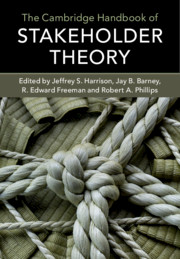Book contents
- The Cambridge Handbook of Stakeholder Theory
- The Cambridge Handbook of Stakeholder Theory
- Copyright page
- Contents
- Contributors
- Chapter Summaries
- Part I Theoretical Foundations of Stakeholder Theory
- Part II Stakeholder Theory and Society
- Chapter 5 Sustainable Wealth Creation
- Chapter 6 Connecting Stakeholder Theory to the Law and Public Policy
- Chapter 7 Shareholder Primacy vs. Stakeholder Theory
- Chapter 8 Business, the Natural Environment, and Sustainability
- Part III Stakeholder Theory in the Business Disciplines
- Part IV Stakeholder Theory in Education and Practice
- Part V New Voices in Stakeholder Thinking
- Index
- References
Chapter 7 - Shareholder Primacy vs. Stakeholder Theory
The Law as Constraint and Potential Enabler of Stakeholder Concern*
from Part II - Stakeholder Theory and Society
Published online by Cambridge University Press: 01 May 2019
- The Cambridge Handbook of Stakeholder Theory
- The Cambridge Handbook of Stakeholder Theory
- Copyright page
- Contents
- Contributors
- Chapter Summaries
- Part I Theoretical Foundations of Stakeholder Theory
- Part II Stakeholder Theory and Society
- Chapter 5 Sustainable Wealth Creation
- Chapter 6 Connecting Stakeholder Theory to the Law and Public Policy
- Chapter 7 Shareholder Primacy vs. Stakeholder Theory
- Chapter 8 Business, the Natural Environment, and Sustainability
- Part III Stakeholder Theory in the Business Disciplines
- Part IV Stakeholder Theory in Education and Practice
- Part V New Voices in Stakeholder Thinking
- Index
- References
Summary
This chapter examines the Shareholder Primacy Norm (SPN) as a widely acknowledged impediment to corporate social responsibility (CSR), including how this relates to Stakeholder Theory. We start by explaining the SPN and then review its status under US and UK law and show that it is not a legal requirement, at least under the guise of shareholder value maximization. This is in contrast to the common assertion that managers are legally constrained from addressing CSR issues if doing so would be inconsistent with the economic interests of shareholders. Nonetheless, while the SPN might be muted as a legal norm, we show that it is certainly evident as a powerful social norm among managers and in business schools— reflective, in part, of the sole voting rights of shareholders on corporate boards and of the dominance of Shareholder Theory. We argue that this view of CSR is misguided, not least when associated with claims of a purported legally enforceable requirement to maximize shareholder value. We propose two ways by which the influence of the SPN among managers might be attenuated: extending voting rights to non-shareholder stakeholders or extending fiduciary duties of executives to non-shareholder stakeholders.
- Type
- Chapter
- Information
- The Cambridge Handbook of Stakeholder Theory , pp. 117 - 131Publisher: Cambridge University PressPrint publication year: 2019
References
- 5
- Cited by

